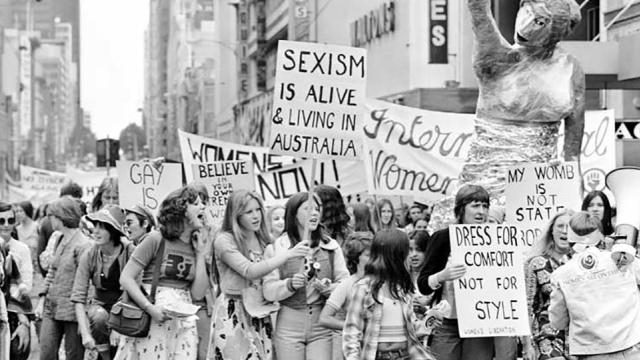
Women's rights demonstration in Melbourne to mark International Women's Day, 8 March 1975. National Archives of Australia
Rising from the ashes of patriarchally induced historical amnesia, feminist history is now delivered to us in discontinuous ‘chunks’ of activist time or tenuously connected crests and troughs. The perception that this narrative gives us of discontinuity spurs feelings of disconnection as feminists struggle to forge links with their predecessors. It often leaves new generations of activists feeling as if they are burdened with the overwhelming task of beginning feminism anew. Yet, there is a long history of memory activism that saw feminists striving to ensure the intergenerational transmission of feminist knowledge so that younger women would be aware that they could build directly on their predecessors’ momentum to realise their feminist futures. In this paper, I carry out an analysis of feminist ‘time, place, everywhen’ by framing International Women’s Year (1975) in Australia as a crossroads where intergenerational feminist desires for historical and affective connection intersected.
Speaker:
Sharon Crozier-De Rosa is Professor in History at the University of Wollongong. Her research focuses on memory cultures, emotions and affect, and histories of activisms from anti-colonial to feminist to archival. She currently leads an ARC Discovery Project on gender, social movements, and cultural heritage, and books include Remembering Women’s Activism (with Vera Mackie, 2019), Shame and the Anti-Feminist Backlash: Britain, Ireland and Australia, 1890–1920 (2018), and Sources for the History of Emotions (with Katie Barclay and Peter Stearns, 2020). She is Deputy Editor of Women’s History Review and President of Irish Studies Association of Australia and New Zealand.
Location
Speakers
- Professor Sharon Crozier-De Rosa (University of Wollongong)
Contact
File attachments
| Attachment | Size |
|---|---|
| WIPS_Sharon_Crozier-De_Rosa_14-5-24.pdf(550.01 KB) | 550.01 KB |